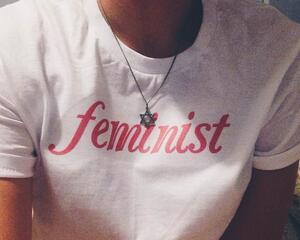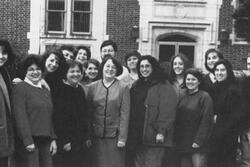Walking Contradiction
“Judaism and feminism? Aren’t those contradictory?” an elderly Jewish man remarked to me and fellow blogger Caroline as we left a Saturday morning minyan.
“You’d be surprised,” Caroline tactfully responded.
As he walked away, we turned and looked at each other incredulously. How many people believe that the two are uncombinable?
The definition of intersectionality is “the interconnected nature of social categorizations.” In more straightforward terms, this means that you cannot separate one part of your identity from another. When people define their feminism as intersectional, they are incorporating multiple parts of themselves into their feminist identities. I think of myself as a Jewish feminist (y’know, that’s how I got here).
It seems as though these two labels would denote separate things. Judaism is an ancient religion, famous for wizened old Rabbis and Hannukah. Feminism is a modern movement meant to bring radical change to the world around us. But I find that I wouldn’t think about feminism the way I do without my Jewish upbringing, and vice versa.
I attend a Reform temple in Boston that emphasizes strong political involvement and social justice. Last fall, I took a class in their Teen Ed program called Tikkun (named after the Jewish value Tikkun Olam, the repairing of the world). In the class, we reviewed current events and political issues and discussed them, studied Jewish firebrands throughout history, and looked at Bible texts containing debate or compromise. The class culminated in a trip to the Massachusetts State House, where we met with lawmakers and lobbied for causes we believed in.
Tikkun class asked each of us to look at the world around us and pick something we wanted to change, then asked us to analyze that problem and act on our feelings. Tikkun taught me that it’s not enough to educate and debate about certain issues. While those are both important, you also have to go out and fight for what’s right. Leaving the State House that day, we felt that, just maybe, we had made a difference.
That same feeling of empowerment is what drew me towards feminism. The feminist movement asks the same question that our Rabbi asked us in Tikkun—what’s wrong with the world around you, and most importantly, how can we change it? It’s the power of individuals working together and the power of moral obligation for justice that makes feminism such a strong force. Those are values that I take pride in, and values that I first learned as a young girl in Hebrew school.
When I look at the world that I live in, I see things that I believe are wrong and I see things I don’t agree with. Because I identify as female, it makes sense that I would be drawn more to the issues concerning women’s rights—it should be no secret that while progress has been made before my generation, there is not yet gender equality in America. I care because these issues will directly affect me more and more as I grow older, and I want to take part in eradicating these issues before the next generation of girls grows up. To me, the fight for gender equality is a form of tzedek—the Jewish value of justice and righteousness.
When I first began my education on feminism, I was amazed that I had never heard of these women before--amazing, strong women who took the fight for justice into their own hands and sparked a revolution (saving some of the fire for their bras). I wanted to learn everything I could about their stories, and I dove into research head-on and passionately. The thought that I could someday do something that follows in their footsteps gives me hope and the ambition to further pursue my interest in social justice.
It took some time for me to not feel awkward telling people that I am a feminist, just as I didn’t want to make people uncomfortable by telling them I am Jewish. Both labels come with serious stereotypes--many of us have seen caricatures of the angry, man-shaming feminist as well as the frum, money-crazed Jew. But as time went on, I cared less and less. I’ve had such amazing experiences with both of these movements (and often, with both of those movements combined), and I want to share my experiences regardless of the fact that I might be judged, as I was at that minyan I went to with Caroline, for identifying as a “Jewish feminist.”
If I had managed to respond to the elderly Jewish man, I would have explained to him how close these two identities are. Feminism and Judaism are both major parts of my life, and I have digested so many mottos and values from both of them that I no longer think of it as “my Jewish values” or “my feminist values.” They’re my human values that shape what I do and how I do it. Just because one is thousands of years old and the other was formed in the modern era doesn’t mean they have to contradict each other. In fact, they work together wonderfully.
This piece was written as part of JWA’s Rising Voices Fellowship.







